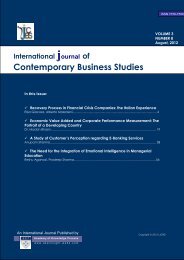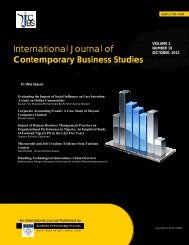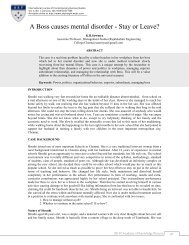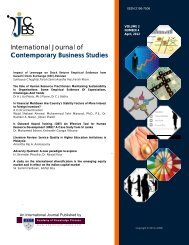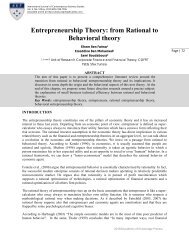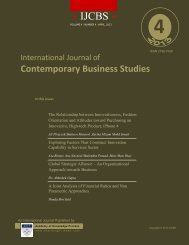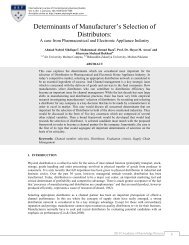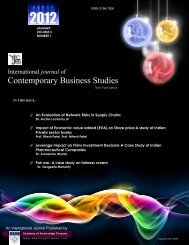Contemporary Business Studies - Academy of Knowledge Process ...
Contemporary Business Studies - Academy of Knowledge Process ...
Contemporary Business Studies - Academy of Knowledge Process ...
You also want an ePaper? Increase the reach of your titles
YUMPU automatically turns print PDFs into web optimized ePapers that Google loves.
International Journal <strong>of</strong> <strong>Contemporary</strong> <strong>Business</strong> <strong>Studies</strong>Vol: 4, No: 2. February, 2013 ISSN 2156-7506Available online at http://www.akpinsight.webs.comTable11.1: Chi-Square TestsValueDfAsymp. Sig.(2-sided)Pearson Chi-Square 57.469 a 12 0.000Likelihood Ratio 74.881 12 0.000Linear-by-Linear Association 42.829 1 0.000No. <strong>of</strong> Valid Cases 65a. 16 cells (80.0%) have expected count less than 5. The minimum expected count is 0.15.If the p-value is greater than the level <strong>of</strong> significance, accept H 0 and reject H 1 , otherwise reject H 0 andaccept H 1 . In this case, the p-value = 0.000 and the level <strong>of</strong> significance is 0.050, therefore, we accept H 1which says “the necessary skills <strong>of</strong> Forensic Accountants as identified by both academics andpr<strong>of</strong>essionals will meet employers’ expectations” and reject H 0 .Finally, in Section C <strong>of</strong> our questionnaire, we asked the respondents to answer some questions regarding“education for and typical career-paths <strong>of</strong> FA’s.” First, we asked them, “Other than accounting, whatundergraduate degree major do you think is most appropriate for a forensic accountant (FA)?” Sixtypercent <strong>of</strong> the respondents answered “computer information systems” and twenty-seven percent answered“legal studies.” Table 11 presents the results for this question. We also asked, “What is the highest-level<strong>of</strong> education that you think is needed to be a successful FA?” Fifty-nine percent <strong>of</strong> the participantsindicated that an undergraduate degree is the highest-degree necessary, while thirty-nine percent felt thata master’s degree is necessary. Finally, participants were asked, “What is the typical career-path for a FAin your firm?” Forty-three percent indicated that the typical career path is to graduate with a degree inaccounting and start in the audit department <strong>of</strong> the firm.Table 11: EducationUndergraduate degree major most appropriatePercentComputer Information Systems 60.4Economics 3.2Legal <strong>Studies</strong> 27.0Other 9.4Total 100.00Highest Level <strong>of</strong> Education Needed to be SuccessfulUndergraduate degree 58.5Master’s Degree 39.0Other Degree 2.5Total 100.00Typical Career PathStart as intern 13.2Graduate with degree in forensic accounting and join firm 7.5Graduate with degree in accounting and start in audit department <strong>of</strong> firm 42.8Work in legal pr<strong>of</strong>ession before joining firm 0.6Work in law enforcement before joining firm 3.8Other 32.1Total 100.002013©<strong>Academy</strong> <strong>of</strong> <strong>Knowledge</strong> <strong>Process</strong>75



